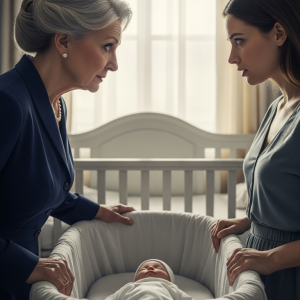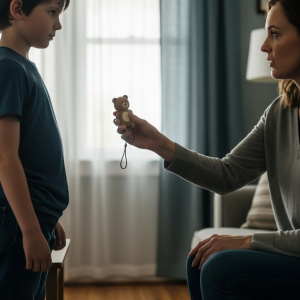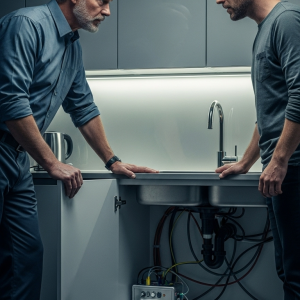The house had become a sanctuary of sickness. The curtains in their once-bright bedroom were perpetually drawn, casting the room in a dim, funereal twilight. The air was heavy with the scent of herbal remedies and the unspoken specter of loss. For three months, David’s life had shrunk to the four walls of this room, his world entirely consumed by the care of his wife, Catherine.
She lay propped against a mountain of pillows, her face pale and drawn, her movements slow and deliberate. Her illness was as mysterious as it was aggressive. The local doctors had been baffled. They had run every test, every scan, only to come up with nothing definitive.
It was Catherine who had found the “expert.” A Dr. Jean-Luc Moreau in Switzerland, a supposed pioneer in treating rare, undiagnosed cellular disorders. All of their communication had been through encrypted emails and brief, hushed phone calls that Catherine insisted on taking alone. “His English isn’t perfect, darling,” she’d whisper. “And with patient confidentiality laws over there, it’s just easier if I handle it. You just focus on us.”
This morning, she had handed him the official-looking folder from the Swiss clinic. It was a dense collection of medical charts and lab reports, filled with terminology so complex it was dizzying. But the summary, written in stark, terrifying English, was clear. It described a rapidly deteriorating condition and a single, desperate hope.
“It’s a new experimental gene therapy,” Catherine explained, her voice a fragile, trembling whisper. “Dr. Moreau says I am a perfect candidate. But it’s… it’s not covered by insurance. It’s considered off-protocol. We have to fund it ourselves, and we have to do it now. He says time is running out.”
She handed him the final page. It was an invoice for the initial treatment. One hundred thousand dollars. To be paid in cash via a wire transfer. The urgency was a physical pressure in the room, a ticking clock counting down the seconds of his wife’s life. He felt cornered, helpless, and utterly terrified.
Later that day, David sat alone in his study, the Swiss “medical file” on the desk in front of him. The number—$100,000—stared up at him, a demand that felt like a death sentence for their finances. They didn’t have that kind of liquid cash. Not even close.
But he knew, with a sinking, hollow feeling in his gut, that he did have access to it.
He opened the bottom drawer of his desk and pulled out a thick portfolio. The cover was simple, bearing the name of a prestigious investment firm. But to David, it was so much more than a stock portfolio. It was the last, tangible piece of his father.
His dad, Captain John Sterling of the FDNY, hadn’t died on September 11, 2001. He had survived the collapse of the towers, only to spend months working on the pile at Ground Zero, breathing in the toxic dust that hung in the air like a permanent shroud. The cancer had come a decade later, aggressive and merciless, a direct result of the poisons he’d inhaled.
The stock portfolio was the full and final payment from the September 11th Victim Compensation Fund. It was a number assigned to his father’s life, a government apology for his heroic sacrifice. It was meant to be a foundation for David’s future, a legacy of honor and bravery. It was sacred.
He thought of his father’s gruff, warm laugh, of the way he could make any problem seem small. ‘You do what you have to do for family, kid,’ he could almost hear him say. ‘That’s the only rule that matters.’
With tears blurring his vision, David picked up the phone. His voice was hoarse as he spoke to his financial advisor. “This is David Sterling. I need to liquidate the entire VCF portfolio. Yes, all of it. I understand the tax implications. Please, just do it. It’s an emergency.”
He was selling the memory of one hero to save the life of the woman he loved. It was a choice that felt like it was tearing him in two, but in his heart, he knew it wasn’t a choice at all. He transferred the money to Catherine’s account. The next morning, with a brave smile and a whispered promise to come back healthy, she was gone, on a one-way flight to Switzerland.
The week that followed was the longest of David’s life. The house, once heavy with sickness, was now hollow with an unnerving silence. He waited for news, for an email from the clinic, for a call from Catherine. He sent several texts, but her replies were brief and sporadic. ‘Arrived safely. Very tired. Tests starting tomorrow. I love you.’
Then, nothing. For three days, a complete and total silence. His anxious messages went unanswered. He tried to tell himself she was simply too weak, that the “experimental therapy” was taking all her strength. But a cold, ugly seed of fear was beginning to sprout in the pit of his stomach.
A week to the day after she had left, an email appeared in his inbox. The sender was an encrypted, anonymous address. The subject line contained only six words.
Subject: I think you should see this.
His first thought was that it was a virus, a phishing scam. But something compelled him to open it. The body of the email was empty, containing only a single, hyperlink. It was to a website he’d never heard of: ‘Riviera Whispers,’ an online society blog that chronicled the decadent lives of Europe’s elite.
His finger hovered over the trackpad, a strange sense of dread washing over him. He clicked.
The webpage loaded onto a gallery of high-resolution photographs under the headline: “Sunshine and Champagne: The Monaco Yacht Week Kick-Off.” The images were a gaudy explosion of wealth and leisure. Tanned bodies, designer sunglasses, glittering jewelry, all set against the backdrop of a turquoise Mediterranean Sea.
He scrolled through the first few photos, confused. Why would anyone send this to him? Then he stopped. His heart seized in his chest. His breath caught in his throat.
It was Catherine.
She was standing on the deck of a magnificent yacht, laughing, her head thrown back in pure, unadulterated joy. She was wearing a tiny bikini, her body tanned, toned, and radiating a vibrant, impossible health. In her hand was a flute of champagne. She looked anything but sick. She looked reborn.
He scrolled to the next photo. It was her again, this time lounging on a deck chair, her arm draped around the shoulders of an older, distinguished-looking man with silver hair. They were smiling at each other, their intimacy casual and undeniable.
David’s mind refused to process what his eyes were seeing. It had to be a mistake. An old photo. But the date stamp on the gallery was from two days ago. He looked at the caption beneath the photo, his blood turning to ice.
“American heiress Catherine Sterling and her longtime beau, the celebrated Dr. Jean-Luc Moreau, enjoy the Mediterranean sun after a reported ‘successful venture’ in Zurich. The happy couple are said to be celebrating their good fortune.”
Dr. Jean-Luc Moreau. The name from the medical files. Her “pioneering specialist.” Her “last hope.”
With trembling fingers, David opened a new browser tab. He typed the name “Dr. Jean-Luc Moreau” into the search bar. The first result was not from a medical journal. It was an article from Reuters, dated two years ago.
The headline was stark: “French Physician’s License Revoked Amidst International Medical Fraud Investigation.” The article detailed how Dr. Moreau had been the ringleader of a sophisticated criminal enterprise, preying on vulnerable families by creating false diagnoses of rare diseases and selling them non-existent “miracle cures.” He had been stripped of his license but had evaded prosecution by fleeing the country.
David pushed his chair back from the desk, a low, animal sound of anguish escaping his lips. The vague symptoms. The isolation from the “doctors.” The insistence on cash. The betrayal wasn’t just that she was with another man. The betrayal was that there had never been an illness. His sacrifice, the sacred legacy of his father, had not been used to fund a cure. It had been used to fund a vacation for a pair of professional criminals.
The grief that washed over David was a physical thing, a crushing wave that left him breathless. It was the grief of a love he now realized had been a complete fabrication. But as the hours passed, the all-consuming pain began to cool, hardening into something else. It was a cold, clear, and diamond-hard fury.
He thought about a simple, messy revenge. Sending the photos to her family. Plastering them all over social media. But it felt too small, too petty for the scale of this crime. They hadn’t just broken his heart; they had desecrated the memory of his father. They had used a hero’s legacy to fund their squalid little con. This required more than revenge. This required justice.
He was no longer a grieving husband. He was the son of a firefighter. He knew what it meant to run toward a fire, not away from it.
He spent the next two days in a focused, methodical trance. He gathered every piece of evidence: the initial forged medical reports, the invoice for the “treatment,” the wire transfer confirmation for the $100,000, and high-resolution copies of the photos and articles from the Riviera Whispers blog. He created a meticulous timeline of events, documenting every lie, every manipulation.
He did not call a divorce lawyer. He did not call the local police. He picked up the phone and dialed the main field office of the Federal Bureau of Investigation. He knew that what they had done—using wire transfers and the internet to perpetrate a fraud across state and international lines—was a federal crime.
The FBI agent who handled his case, a sharp, empathetic woman named Agent DeMarco, listened to his story without interruption, her expression growing grimmer with each detail. When he was finished, she looked at the file he had prepared.
“Mr. Sterling,” she said, her voice firm. “What you have experienced is a horrific betrayal. It is also a textbook case of a highly organized, international wire fraud scheme. You’ve given us more than enough to open a formal investigation.”
The wheels of justice began to turn with a speed and force that David could not have imagined. The FBI, working through their legal attaché in Europe, coordinated with Interpol. A red notice—an international arrest warrant—was issued for Catherine Sterling and Jean-Luc Moreau.
The news broke a week later. A frantic, desperate-sounding Catherine called David from an unknown number. “David, you have to help me! The police are here! They’re saying terrible things! It’s all a misunderstanding!”
“Was the yacht in Monaco a misunderstanding, Catherine?” David asked, his voice devoid of all emotion. “Was the champagne a misunderstanding? Or was it the money you stole from my dead father?” He hung up the phone.
The arrest was an international media sensation. The photos of Catherine and her lover, tanned and laughing on their yacht, were splashed across news sites next to images of them being led in handcuffs by Italian Carabinieri as their boat docked in Portofino. The story was irresistible: the glamorous con artists who had callously exploited the legacy of a 9/11 hero.
The financial destruction was absolute. Investigators discovered a network of offshore accounts. All of them were frozen and seized. The $100,000, along with millions more from other victims they had identified, was recovered. Catherine’s life of curated luxury, funded by the pain of others, was over. She was extradited back to the United States, penniless and disgraced, to face a long list of federal charges.
A year later, the legal battles were over. Catherine and Jean-Luc were convicted, their sophisticated scam dismantled for good. The court ordered full restitution, and the $100,000 was returned to David.
He sat with his financial advisor, the same man he had made that gut-wrenching call to a year earlier. The portfolio report in front of him showed the restored balance.
“So, we’ll reinvest this back into the original fund structure?” the advisor asked. “It’s a solid, conservative growth plan.”
David shook his head. “No,” he said, a quiet certainty in his voice. “I’m not putting it back. I’m going to give it away.”
Two months later, he stood at a podium in a crowded hall at the FDNY headquarters in Brooklyn. Behind him was a banner bearing a new logo and a name.
“My father, Captain John Sterling, died because he ran into a fire to save others,” David said, his voice strong and clear. “His legacy, the money meant to honor his sacrifice, was stolen. But I got it back. And I realized that legacy shouldn’t be sitting in a stock market account. It should be doing what my father did. It should be helping.”
He looked out at the assembled crowd of firefighters, police officers, and their families. “Today, I am officially launching the Sterling First Responders Support Fund. This money will be used to provide direct financial grants to the families of first responders who are facing medical hardship as a result of their service. It will not be a loan. It will be a gift. A thank you.”
The betrayal he had suffered had, in a strange and painful way, illuminated his path. It had forced him to see that his father’s legacy was not a sum of money to be protected, but a spirit of service to be continued. He had taken the ugliest of betrayals and forged it into a beautiful, enduring tribute. As he stepped down from the podium to the sound of a standing ovation, David felt a sense of peace he hadn’t felt in years. He had finally brought his father’s legacy home.




